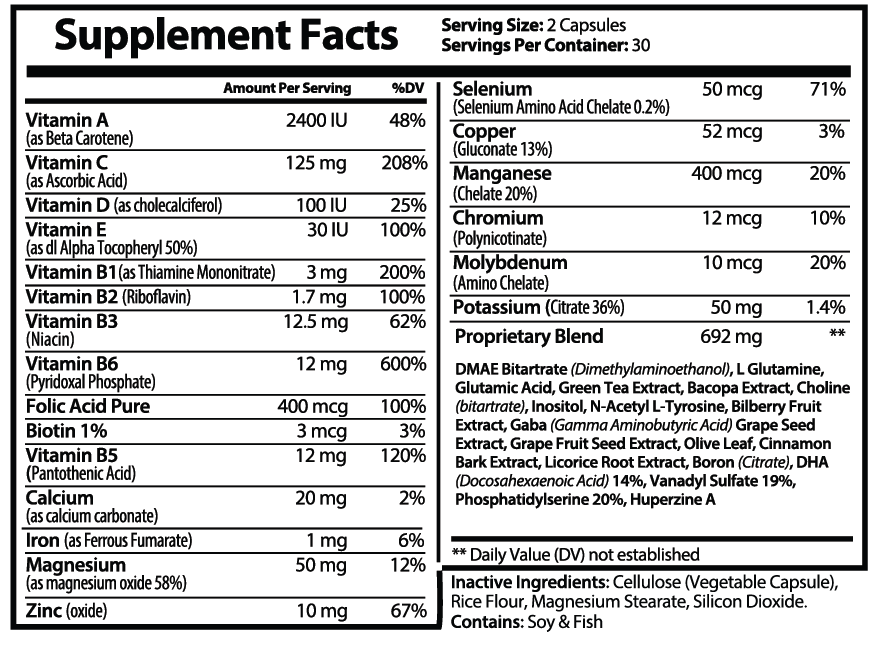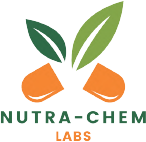- Description
- Key Ingredients & Benefits
- Usage & Directions
- Quality Standards
- Warnings
- Sources
BrainFlow Ultra is a cutting-edge supplement designed to enhance cognitive function, mental clarity, focus, immune health, and energy production. Crafted with high-quality, research-backed ingredients, it provides comprehensive support for both brain and body wellness.
Vitamins (A, B Complex, C, D, E):
-Support energy metabolism, immune health, and antioxidant protection.
-Boost cognitive performance and enhance cardiovascular and bone health.
Essential Minerals (Magnesium, Zinc, Selenium, Iron):
-Promote nerve function, muscle health, and immune system balance.
-Aid in regulating blood sugar and reducing inflammation.
Nootropics (DMAE, Huperzine A, N-Acetyl Tyrosine):
-Enhance focus, memory, and learning.
-Combat stress and support neuroprotection.
Antioxidants (Green Tea Extract, Grape Seed Extract, Olive Leaf):
-Protect against oxidative stress and inflammation.
-Support cardiovascular and metabolic health.
Omega-3s (DHA):
-Enhance cognitive health, reduce inflammation, and promote cardiovascular wellness.
Take 2 veggie capsules daily, preferably 20–30 minutes before a meal, with an 8 oz glass of water, or as directed by your healthcare professional.
- Made in the USA in an FDA-registered, GMP-certified facility and third-party tested for heavy metals and impurities.
- Only 1% of supplements match the rigorous quality of BrainFlow Ultra.
-*These statements have not been evaluated by the Food and Drug Administration. This product is not intended to diagnose, treat, cure, or prevent any disease. -Tamper Seal: Use only if the seal is intact. Consult your health care practitioner if you are pregnant or nursing, taking medications, or have a medical condition, before taking this or any other product. -Store in a cool, dry place. Keep out of reach of children.
38. Ueland, P. M., McCann, A., Midttun, Ø., & Ulvik, A. (2017). Inflammation, vitamin B6 and related pathways. Molecular aspects of medicine , 53 , 10–27. https://doi.org/10.1016/j.mam.2016.08.001
39. Bird R. P. (2018). The Emerging Role of Vitamin B6 in Inflammation and Carcinogenesis. Advances in food and nutrition research , 83 , 151–194. https://doi.org/10.1016/bs.afnr.2017.11.004
65. Bailey, L. B., Stover, P. J., McNulty, H., Fenech, M. F., Gregory, J. F., 3rd, Mills, J. L., Pfeiffer, C. M., Fazili, Z., Zhang, M., Ueland, P. M., Molloy, A. M., Caudill, M. A., Shane, B., Berry, R. J., Bailey, R. L., Hausman, D. B., Raghavan, R., & Raiten, D. J. (2015). Biomarkers of Nutrition for Development-Folate Review. The Journal of nutrition , 145 (7), 1636S–1680S. https://doi.org/10.3945/jn.114.206599
92. Thakur, K., Tomar, S. K., Singh, A. K., Mandal, S., & Arora, S. (2017). Riboflavin and health: A review of recent human research. Critical reviews in food science and nutrition , 57 (17), 3650–3660. https://doi.org/10.1080/10408398.2016.1145104
93. Suwannasom, N., Kao, I., Pruß, A., Georgieva, R., & Bäumler, H. (2020). Riboflavin: The Health Benefits of a Forgotten Natural Vitamin. International journal of molecular sciences , 21 (3), 950. https://doi.org/10.3390/ijms21030950
94. DiNicolantonio, J. J., Niazi, A. K., Lavie, C. J., O'Keefe, J. H., & Ventura, H. O. (2013). Thiamine supplementation for the treatment of heart failure: a review of the literature. Congestive heart failure (Greenwich, Conn.) , 19 (4), 214–222. https://doi.org/10.1111/chf.12037
95. Saedisomeolia, A., & Ashoori, M. (2018).Thiamine in Human Health: A Review of Current Evidences. Advances in food and nutrition research , 83 , 57–81. https://doi.org/10.1016/bs.afnr.2017.11.002
97. Carr, A. C., & Maggini, S. (2017). Vitamin C and Immune Function. Nutrients , 9 (11), 1211. https://doi.org/10.3390/nu9111211
98. DePhillipo, N. N., Aman, Z. S., Kennedy, M. I., Begley, J. P., Moatshe, G., & LaPrade, R. F. (2018). Efficacy of Vitamin C Supplementation on Collagen Synthesis and Oxidative Stress After Musculoskeletal Injuries: A Systematic Review. Orthopaedic journal of sports medicine , 6 (10), 2325967118804544. https://doi.org/10.1177/2325967118804544
182. Eggersdorfer, M., & Wyss, A. (2018). Carotenoids in human nutrition and health. Archives of biochemistry and biophysics , 652 , 18–26. https://doi.org/10.1016/j.abb.2018.06.001
183. Sunkara, A., & Raizner, A. (2019). Supplemental Vitamins and Minerals for Cardiovascular Disease Prevention and Treatment. Methodist DeBakey cardiovascular journal , 15 (3), 179–184. https://doi.org/10.14797/mdcj-15-3-179
184. Age-Related Eye Disease Study Research Group (2001). A randomized, placebo-controlled, clinical trial of high-dose supplementation with vitamins C and E, beta carotene, and zinc for age-related macular degeneration and vision loss: AREDS report no. 8. Archives of ophthalmology (Chicago, Ill. : 1960) , 119 (10), 1417–1436. https://doi.org/10.1001/archopht.119.10.1417
204. Jovic, T. H., Ali, S. R., Ibrahim, N., Jessop, Z. M., Tarassoli, S. P., Dobbs, T. D., Holford, P., Thornton, C. A., & Whitaker, I. S. (2020). Could Vitamins Help in the Fight Against COVID-19?. Nutrients , 12 (9), 2550. https://doi.org/10.3390/nu12092550
205. Traber, M. G., & Atkinson, J. (2007). Vitamin E, antioxidant and nothing more. Free radical biology & medicine , 43 (1), 4–15. https://doi.org/10.1016/j.freeradbiomed.2007.03.024
206. Wu, D., & Meydani, S. N. (2014). Age-associated changes in immune function: impact of vitamin E intervention and the underlying mechanisms. Endocrine, metabolic & immune disorders drug targets , 14 (4), 283–289. https://doi.org/10.2174/1871530314666140922143950
207. De la Fuente, M., Hernanz, A., Guayerbas, N., Victor, V. M., & Arnalich, F. (2008). Vitamin E ingestion improves several immune functions in elderly men and women. Free radical research , 42 (3), 272–280. https://doi.org/10.1080/10715760801898838
208. Browne, D., McGuinness, B., Woodside, J. V., & McKay, G. J. (2019). Vitamin E and Alzheimer's disease: what do we know so far?. Clinical interventions in aging , 14 , 1303–1317. https://doi.org/10.2147/CIA.S186760
213. Mock DM. Biotin: From Nutrition to Therapeutics. J Nutr. 2017 Aug;147(8):1487-1492. doi: 10.3945/jn.116.238956. Epub 2017 Jul 12. PMID: 28701385; PMCID: PMC5525106.
214. Patel DP, Swink SM, Castelo-Soccio L. A Review of the Use of Biotin for Hair Loss. Skin Appendage Disord. 2017 Aug;3(3):166-169. doi: 10.1159/000462981. Epub 2017 Apr 27. PMID: 28879195; PMCID: PMC5582478.
215. Cappellini, M. D., Musallam, K. M., & Taher, A. T. (2020). Iron deficiency anaemia revisited. Journal of internal medicine , 287 (2), 153–170. https://doi.org/10.1111/joim.13004
216. Paganini, D., & Zimmermann, M. B. (2017). The effects of iron fortification and supplementation on the gut microbiome and diarrhea in infants and children: a review. The American journal of clinical nutrition , 106 (Suppl 6), 1688S–1693S. https://doi.org/10.3945/ajcn.117.156067
217. Andrews, S. C., Robinson, A. K., & Rodríguez-Quiñones, F. (2003). Bacterial iron homeostasis. FEMS microbiology reviews , 27 (2-3), 215–237. https://doi.org/10.1016/S0168-6445(03)00055-X




